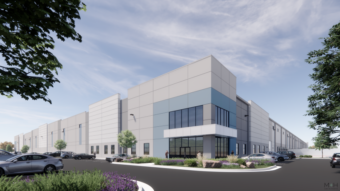Development Solutions, Inc. (DSI), in partnership with Karis Cold, has officially broken ground on Stockyards Cold, a state-of-the-art cold storage facility at 3815 S. Ashland Ave. in Chicago’s McKinley Park neighborhood.
Situated on a 5-acre site, this cutting-edge facility will span 100,000 square feet, designed to meet rising demand in Chicago’s cold storage sector. The groundbreaking event, held on October 18, featured remarks from Jacob Karamol, Owner and Managing Principal of DSI; Jake Finley, Founder and CEO of Karis Cold; and Alderwoman Nicole Lee, who described the project as a pivotal step in the neighborhood’s growth, remarking, “Chicago is open for business—tell your friends.”
This project marks the third collaboration between DSI and Karis Cold. This project is responding to shifting consumer preferences for fresher, less-processed foods and the need for efficient, strategically located cold storage solutions. “Increased inventory levels and aging infrastructure have created an urgent demand for advanced facilities that can support the region’s evolving logistics needs,” said Jake Finley. “We are focused on developing and delivering next- generation infrastructure that aligns with these trends.”
Scheduled for completion in the third quarter of 2025, Stockyards Cold will feature cutting-edge technology capable of maintaining temperatures as low as -10°F, ensuring optimal preservation for a wide range of perishable goods. It will be the first cold storage facility in Chicago to offer a 50-foot clear height and approximately 14,500 pallet positions, with customizable features such as blast freezing, automated racking, and advanced temperature monitoring systems to meet diverse user needs. “This project reflects our commitment to developing efficient, sustainable, and market-ready solutions tailored to tenant needs,” Finley added. “We focus on sector-specific expertise, enabling us to deliver superior results and generate above-market, risk-adjusted returns for our investors and partners.”
“In a market with limited Cold inventory our ability to deliver custom design-build construction solutions for highly technical projects on urban infill sites is a testament to DSI’s construction expertise and adaptability, especially for food users and industrial manufacturers,” said Jacob Karamol, co-owner of DSI. “We offer a fully comprehensive and collaborative approach that prioritizes partnership and an in-depth dive into challenging sites and building details from day one, ensuring our projects not only meet but exceed tenant/client expectations all while considering the project’s budget. Our design-build model allows us to tailor solutions that align with specific operational needs, providing tangible value in a rapidly evolving market. We feel incredibly fortunate to be part of this tremendous project led by Karis Cold”.
The Stockyards Cold project follows Jacksonville Cold, a 265,000-square-foot facility nearing completion in Jacksonville, Florida. Located on 24 acres in Westlake Industrial Park, the project underscores the Karis/DSI team’s focus on flexibility, efficiency, and strategic locations near key logistical nodes. The Jacksonville Cold facility, like its Chicago counterpart, allows operators to maximize efficiency while serving as a gateway to vital regional markets.
With more than a dozen cold storage developments nationwide, Karis Cold remains dedicated to advancing modern logistics infrastructure. Their development strategy emphasizes optimizing sites for efficient operations, featuring deeper loading docks and increased clear heights. The Stockyards Cold facility aligns with Karis’ strategy of targeting key distribution hubs like Chicago, where they previously delivered a 16.38-acre Amazon last-mile fulfillment center on Ashland in collaboration with Avgeris & Associates.
Leasing interest for Stockyards Cold is already strong, with John Basile, of NAI Hiffman serving as the exclusive leasing agent. With supply chain shifts and heightened consumer demand for perishable goods, the project is poised to significantly boost Chicago’s Industrial capacity. It will also deliver economic benefits through construction jobs and permanent positions, all while advancing sustainability goals.




